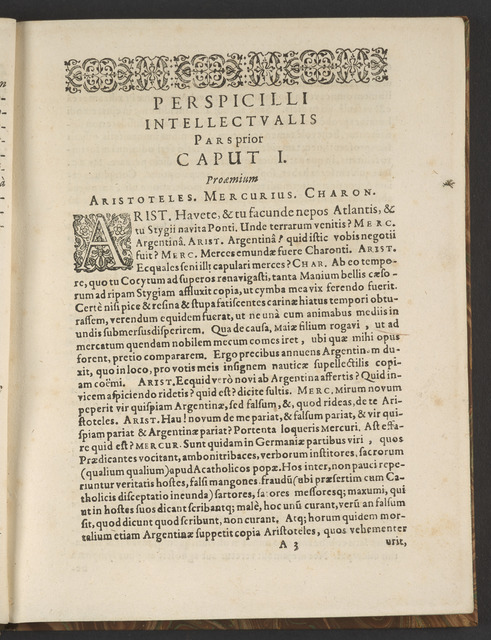XO22 Perspicillum intellectuale Joan-Conrado Dannhavvero Praedicanti Argentinensi ab Aristotele redivivo & minimè recidivo dono datum: quo fallacias ipse suas & lapsus abnormes quibus in Aristotele redivivo recidivando est hallucinatus, pervidere possit: reposita etiam est sub finem utraque pars Aristotelis redivivi / authore R.P. Melchiore Cornaeo ...

Full description
Melchior Cornaeus, Perspicillum intellectuale Joan-Conrado Dannhavvero Praedicanti Argentinensi ab Aristotele redivivo & minimè recidivo dono datum: quo fallacias ipse suas & lapsus abnormes quibus in Aristotele redivivo recidivando est hallucinatus, pervidere possit: reposita etiam est sub finem utraque pars Aristotelis redivivi (Würzburg: Zinck, 1656)
Penn Libraries, Kislak Center for Special Collections, Rare Books and Manuscripts, BX1780 .C67 1656
Melchior Cornaeus (1598-1665), the author of this text, was a German Jesuit. He taught Philosophy and Theology at the Universities of Würzburg and Mainz. He lived during the Thirty Years War, a time of strong contrasts between Catholics and Protestants. A defender of the Catholic faith, Cornaeus wrote numerous texts to reaffirm the superiority of his own confession and try to convert his opponents. Among them, the series of dialogues entitled Aristoteles redivivus (1652-1660), in which the ancient philosopher was brought back to life to convert Protestants. In the first exemplar of the series, for example (Aristoteles redivivus Romano-Catholicus, 1652), the ancient philosopher comes back from the netherworld to find the true faith. After meeting both Protestants and Catholics, he eventually declares: “aut papista, aut non Christianus” (either a supporter of the Pope, or not a Christian). Cornaeus's imaginary Aristotle is taken both as a spokesperson of Catholicism and as a potential point of contact with Protestants, who read and appreciated Aristotle’s teachings. An installment in the Aristoteles redivivus series, the Perspicillum intellectuale was printed by Zinck in 1656. It is meant as a response to the Protestant Johann Conrad Dannhauer, a preacher from Strasbourg who had criticized Cornaeus’s use of Aristotle in 1654. In his response, Cornaeus does not abandon his fiction of the philosopher brought back to life. He titles this text “intellectual telescope”, hoping that Dannhauer will be corrected by his observations, seeing things in a better way.
Achille Giaretta
Comments
to view and add comments.
Annotations
No one has annotated a text with this resource yet.
- typeImage
- created on
- file formatjpg
- file size6 MB


